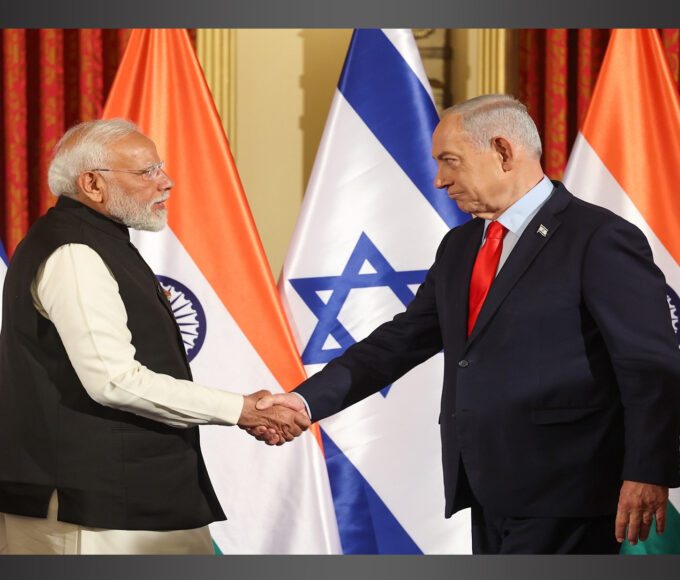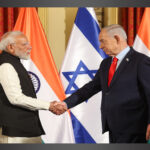AS it threatens to strike at the very roots of India’s unity and internal security, ‘terrorism’ has indeed emerged as the biggest challenge faced by the Indian State, comparable to that posed by corruption, poverty, unemployment and income disparities. Social and economic pressures, frustrated political aspirations and the machinations of inimical forces across the border have all contributed to the terrorist reservoir. Unresolved ethnic and religious conflicts have also been leading sources of terrorism. The virulence of terrorist activity has only increased and spread to more and more regions with every passing year. And today its impact is literally at the doorstep of about every citizen in every region and in every major city or township of this country.
While it is necessary for the State to fulfil its law and order obligations towards the citizens with an iron hand, it is also imperative for the modern democratic welfare State to address the social, economic and political aspirations of its people in accordance with the principles enshrined in its Constitution. The two core responsibilities are inextricably interlinked. The failure to address the aspirations of the peoples through the democratic processes and unresolved ethnic and religious conflicts have been the leading causes of terrorism. In many instances, terrorist groups opposed to the State have grown on the wave of public sympathy due to injustices against weaker groups, minorities, and so on. The deprivation and oppression of such groups provide moral justification for terrorism in the eyes of several affected groups, who argue that they can never win a conventional war against the State. Sympathisers of militant groups are seen to espouse their cause by justifying their activities as a natural reaction to some sense of injustice or denial of rights at the hands of either the majority groups in the societies they refer to, or even the State, against whom they claim to have raised the banner of revolt.
Respectability and legitimacy for the actions of the militant groups is sought to be accorded by alluding to the concept of ‘root causes of terrorism’. Terrorism seeks moorings in philosophies, wherein violence in the pursuit of its objectives can be justified. The expression-“one man’s terrorist is another man’s freedom fighter”-is widely used to portray this philosophy. Many terrorist groups use the nomenclature “freedom fighters” since it lends the garb of morality to what is just a criminal activity.
The claim to legitimacy is sought to be buttressed on the basis of economic, social and political rights guaranteed to individuals and groups under international law, including the Right to Self Determination under specific conditions. India’s Constitution too upholds similar rights. The preamble to the United Nations Declaration of Human Rights (UNDHR), 1948, recognises that rebellion could be an outcome of tyranny and oppression. It says, “if man is not to be compelled to have recourse, as a last resort, to rebellion against tyranny and oppression…human rights should be protected by the rule of law.”
The declaration enjoins upon the States to secure the guaranteed universal standards of human rights for its subjects. Such rights include the right to equality without discrimination based on race, colour, sex, language, religion, political or other opinion, national or social origin, property, birth or other status (Article 2), equal access to public service (Article 21), right to social security (Article 22), and so on. International law requires the States to comply with the ever evolving standards of good governance through affirmative action. Democratic States, unable to effectively resolve population issues relating to the aspirations of regional, linguistic and religious minorities through democratic processes, invariably face increased threats from the menace of terrorism even as the phenomenon of terrorism exploits those very democratic processes to intensify and justify their action.
It is, however, impossible, particularly in societies founded on democratic principles, to justify terrorism. In democratic societies, the political system provides adequate opportunities for articulating and addressing social, economic and political grievances and recourse to terrorist activities in any form cannot be recognised by the modern State. Medieval methods have no place in modern times.
Both domestic and international law unequivocally condemn terrorism as a crime against humanity and do not recognise the concept of ‘root causes’ as a valid argument to defend such crimes. Articles 29 and 30 of the UNDHR itself qualifies the guaranteed rights and requires that such “rights and freedoms in no case be exercised contrary to the purposes and principles of the United Nations”. Further, the rights do not allow the destruction of any of the rights and freedoms (of others) set out in the declaration. Terrorists, by the very nature and methods of their actions, brook no respect for others’ rights. Article 5 of the UN resolution no. 1373 of 2001 unequivocally declares that “the acts, methods and practices of terrorism are contrary to the purpose and principles of the United Nations”.
Terrorist activities of several groups are born with the objective to usurp power and/or to serve the political interests of other States/countries perceived as antagonists. While acknowledging the principle of Right of Self Determination as a valid and legitimate right available to the people, international law does not extend the same to a ‘Right of Secession’ for any national, ethnic, linguistic and religious minority, or any other group. Attempts to draw attention to specific grievances against the State are essentially a ruse to offer some justification behind the real political objective. A State is entitled to defend its sovereignty, territorial integrity and political unity (within the framework of its constitutional order and with due respect for its international obligations) against any illegitimate actions taken under the pretext of realisation of the right to self determination.
IT is important to note that while international law promotes respect for and observance of human rights and fundamental freedoms and enjoins upon the States to ensure their non-discriminatory implementation within a pluralistic democratic framework, it also recognises and sets out the framework within which such rights are to be realised. Any notion of conflict between human rights guaranteed under international law and the right to self determination and the legitimacy of the means and methods to secure redressal for deviations in this regard espoused by apologists on behalf of the terrorist groups is, therefore, misplaced.
The dimensions of the problem of militancy in India need no dilation. India has been facing the brunt of terrorist activities ever since the 1950s, when insurgency reared its head in Nagaland. Later, a perception of neglect on socio-economic and culture-ethnic grounds amongst the people of some of the other States in the Northeast led to the emergence of separatist movements/insurgencies in Manipur, Mizoram, Tripura, Assam and Meghalaya.
The Pakistan factor has had a critical bearing on India’s internal security. Having lost out on conventional wars, Pakistan has actively pursued a policy of exporting terrorism/militancy to India in the name of providing support to the so-called freedom struggle in Kashmir. Even as Jammu and Kashmir and the Northeast continue to remain the underbelly of the national security situation, left-wing extremist activity has managed to infect large parts of the nation’s heartland in recent years and pose a grave threat to India’s security establishment. Left-wing extremism has developed into a venomous conflagration that has spread across a large number of States. The movement has witnessed considerable accretion in its strength, armed capabilities and geographical spread. The phenomenal rise in its reach, support base and organisational capability to effectively strike at will and spread terror, reflects on the strategic failure of the State governments to contain the problem. The latest threat posed by Al-Qaeda, and now also ISIS, has served to accentuate the danger to India’s internal security.
THE key ingredients characterising militancy in different parts of the country satisfy the
conditions which provide a fertile breeding ground for such movements. Militancy across States can be broadly attributed to a variety of factors present in some permutation or combination as below:
(a) Lack of economic development and widening prosperity gap as compared with other regions, resulting in alienation of tribals and other segments of the local population.
(b) Perception of political neglect and arousal of sub-nationalist aspirations.
(c) Issues of political origin as in Nagaland and Jammu and Kashmir.
(d) Assistance to rebel groups by countries inimical to India.
(e) Changes in demographic pattern due to trans-border migration.
(f) Porosity of our land and coastal borders, weak regulatory mechanisms and a liberal regime of cross- border movement.
The writ of the militant groups runs large over the civil and police administration in the affected States and they exercise considerable domination, particularly in the interior and far-flung areas where there is very little governance on the part of the State governments. Militant organisations terrorise the population and are perceived to possess the capacity to strike at will. They use the media to maximum advantage in spreading their own message amongst the population, and refusal to fall in line with their diktats invites severe reprisals.
For financial support vital for the advancement of militancy, militant outfits thrive on rampant extortion, kidnapping for ransom, bank looting, and so on. These outfits practically run a parallel government and raise funds through an organised system of taxation and collection. Government servants, including police, businessmen, traders and contractors, are required to regularly pay a portion of their salary/earnings to such groups. Funds are collected by forcing government departments to award lucrative contracts to its cadres and sympathisers and by forcing non-locals/non-tribal businessmen to pay for doing business. Various types of taxes-house tax on residents of village/town, business tax on traders and shopkeepers, professional tax on professionals such as doctors, engineers, chartered accountants, and taxes on movement of goods collected through illegal check gates on national highways—are imposed for a regular stream of income. This system and other forms of illegal fund-raising have been institutionalised. This is besides the funds received from inimical forces across the border.
It would not be an exaggeration to say that having got used to unlimited sources of such illegal funds, most militant groups have developed a vested interest in continuation of militancy. The promise of easy money has served as an attractive proposition to lure unemployed youth in joining such illegal movements. The fruits of development and economic infrastructure are yet to reach large parts of India’s remote and interior areas and militant movements have specially flourished in such regions. The problem in most parts has got compounded by an administrative culture marked by lack of accountability and non-responsive governance.
Against this background, the confidence level of the people in the ability, and at times the willingness, of the State governments to enforce the rule of law is low. It was, therefore, not surprising for this writer to find it practically impossible to secure people-level cooperation in identifying and reporting militant activity by the common citizen during his tenure as state home secretary, making the task of curbing militancy that much more difficult. There is a deep-rooted and disturbing nexus between corrupt politicians, bureaucrats and businessmen and criminal elements, gradually establishing their control over the administrative system.

Various reports to this effect, including the NN Vohra Committee report submitted in 1993 on criminalisation of politics and administration, have hardly received the attention they deserved. One of the major weaknesses inhibiting the capacities of the State to enforce law and order is that the sympathisers of militant groups have infiltrated government at various levels, specially the police ranks, and including the political level. The net result is there is a parallel system of governance run by the insurgents/militant groups, particularly at the cutting edge level and the civil and police administration have virtually reached a state of collapse.
The common perception about the State lacking the will or the ability to effectively deal with and contain the striking capacity of militant groups, only serves to reinforce the ‘soft State’ image of the government. It would hardly be an exaggeration to say that in large parts of the country affected by the scourge of militancy, the State seems to have indeed ‘withered away’, but certainly not in the idealistic sense that a true follower of Marxism would have visualised his political dream.
National security interests brook no compromises in dealing with the situation. Hard choices have to be exercised. Systemic weaknesses that give rise to or encourage militants/terrorists need to be dealt with by the State with all the authority at its command. The rule of law, which is the cornerstone of the Constitution, and canons of good governance should be upheld as first principles of administration. History provides ample evidence of the consequences of allowing a drift towards lawlessness and failure at timely intervention.
THERE is no denying that it is necessary that the factors that shape and fuel the feeder lines for terrorist activity are dealt with swiftly and decisively. A genuinely responsive administration is the first line of defence against militancy/terrorism. The failure of the system to ensure equitable social and economic development across regions, and its inability to keep pace with population growth and demands for more evenly distributed benefits, has provided a fertile ground for extremism and political violence, affecting national interest adversely. The UN charter has firmly recognised these principles.
It is well acknowledged that, despite defined and elaborate plans, large portions of finances meant for welfare activities do not reach the targetted beneficiaries. The implementation of public welfare and economic projects are marred by inefficiencies and corruption. Prime Minister Rajiv Gandhi, delivering his famous ‘power broker’ speech at the centenary session of the Congress in 1985, expressed his anguish that corruption had not only come to be tolerated but was even regarded as the hallmark of leadership. His concern about less than 20 per cent of government funds reaching the intended beneficiaries is even more relevant today. Greed seems to have overwhelmingly overtaken the desire for public service in an administrative environment lacking the will to enforce accountability.
A paradigm reversal of the current administrative ethos and value system and decisive steps to tackle the critical issues which have fed the virus of terrorism can only be delayed at the cost of national security and growth. The core questions are, whether the promised paradigm shift, characterising the mandate with which the new government has been voted to power at the Centre, will become a reality? Will a corrupted political ethos, backed by a pliant and self-seeking bureaucracy, let that happen? If the answers are in the negative, the sympathisers of militant groups will have reason to claim the high moral ground and seek legitimacy in their war against the State.
The new government, under Prime Minister Narendra Modi’s leadership, has rightly stressed the principles of good governance as the philosophy and guiding force of administration. It has raised the aspirations and expectations of the people to new heights. Time alone will tell whether, and to what extent, the bold initiatives of the government in this regard will vindicate the faith in and hopes of the people from this government.
The writer retired as Secretary to Government of India, Ministry of Women & Child Development, and held several important positions, including as Home Secretary in the State of Nagaland and Joint Secretary in the Ministry of
Home Affairs
















































